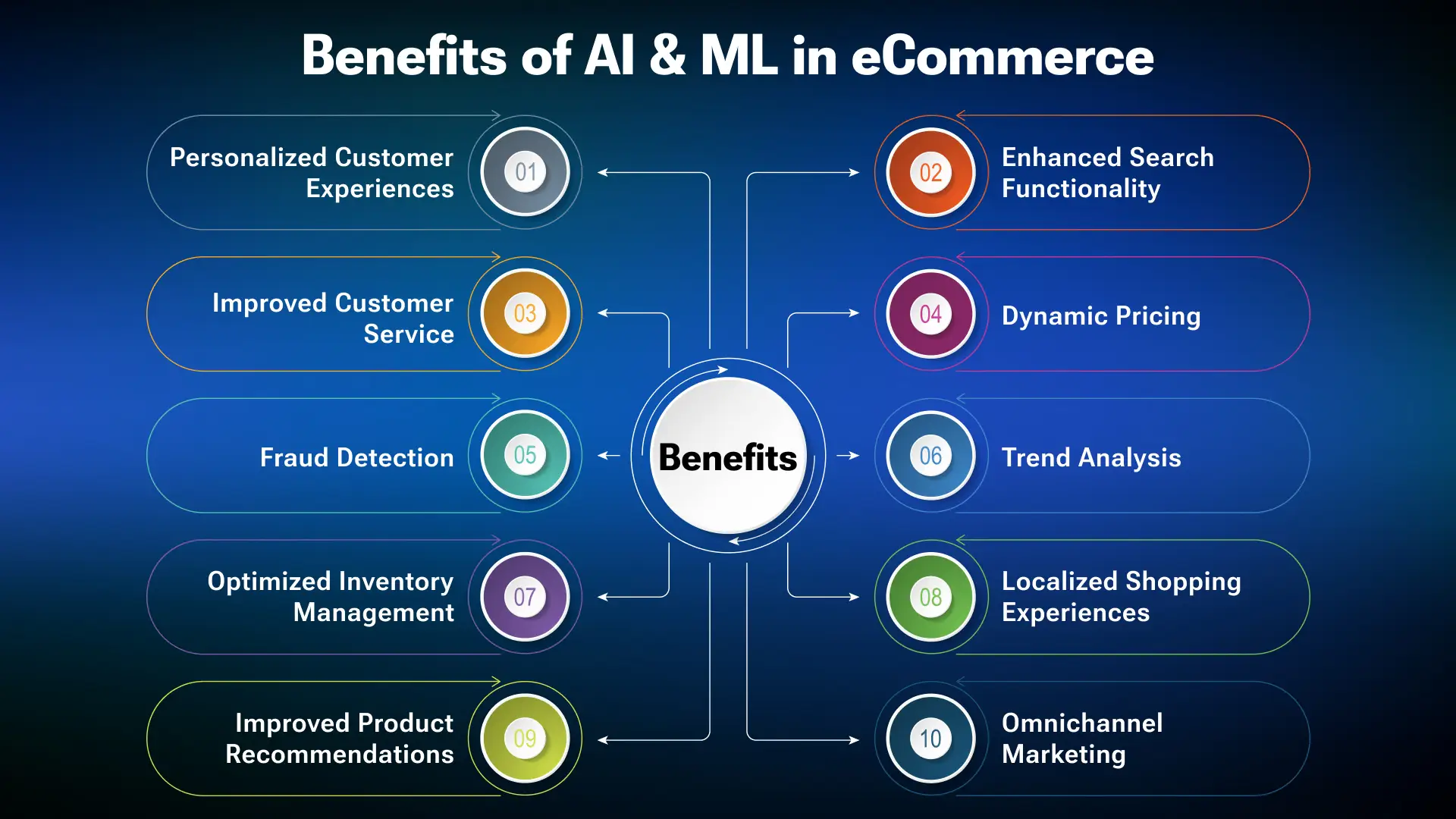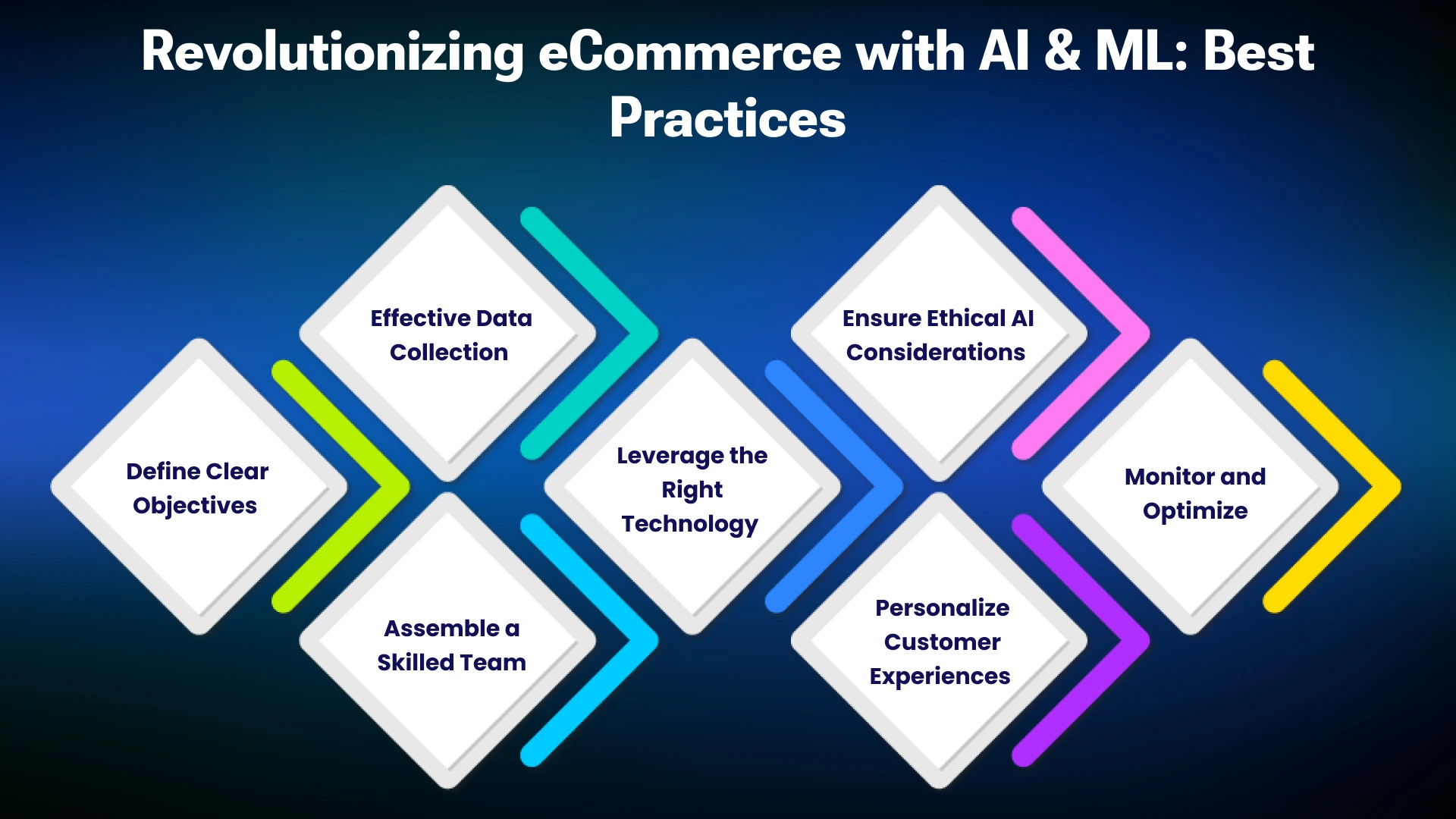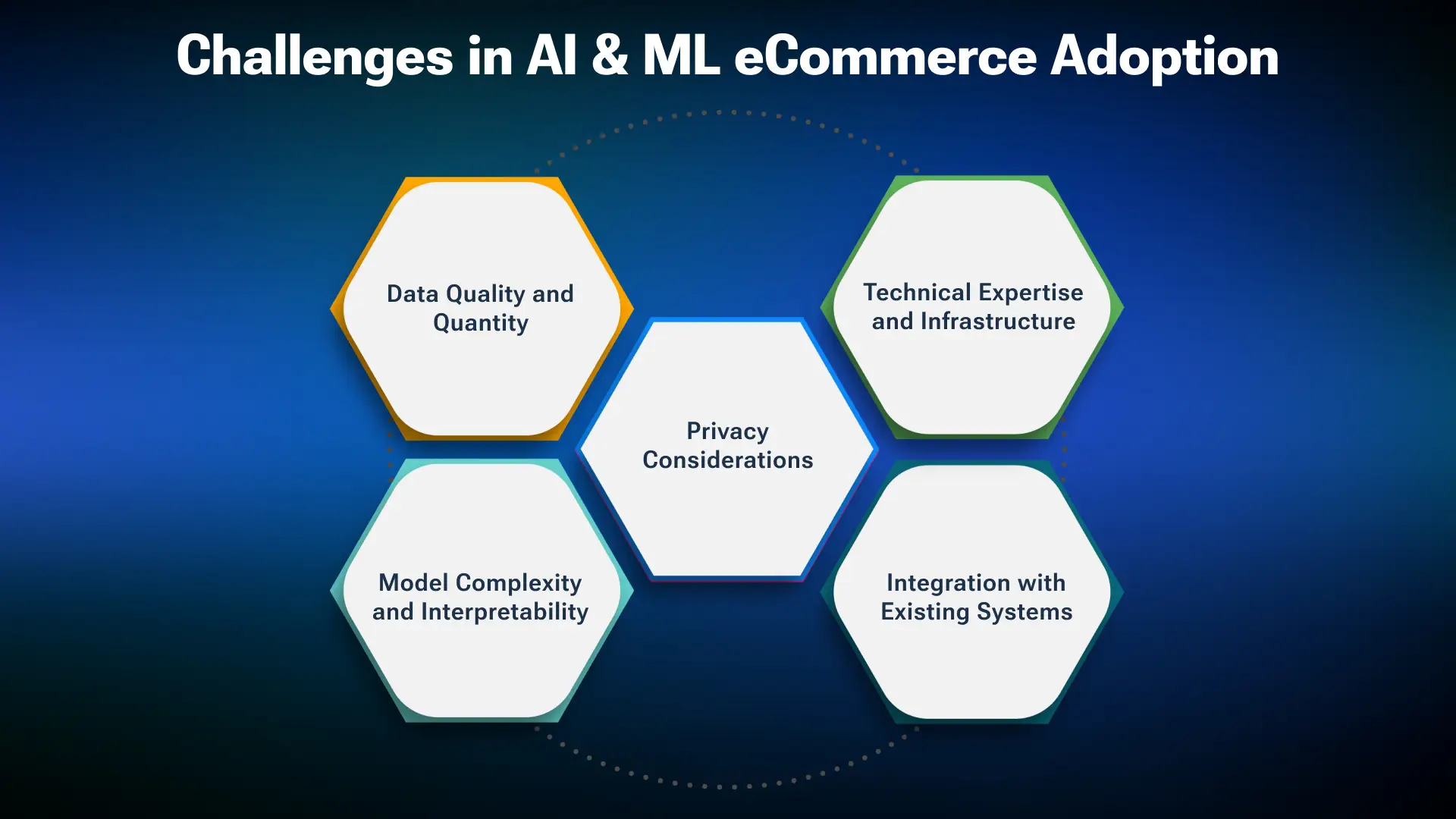Imagine a world where your eCommerce business can anticipate customer needs, deliver hyper-personalized experiences, and optimize operations with pinpoint accuracy. That's the power of AI in eCommerce – the game-changers shaping the future of this dynamic industry.
The US is the largest market in both sectors, highlighting the global significance of AI and ML. Are you an eCommerce CXO ready to leverage this revolution?
The days of one-size-fits-all approaches are fading. These days people expect a lot; personalized experiences, frictionless interaction, and a sense of understanding from the brands they engage with. AI and ML would actually do this for you to give you a competitive edge in the relentless race of eCommerce battleground.
This comprehensive guide will delve into the transformative power of AI and ML in the eCommerce industry. We'll explore the benefits, practical use cases, and best practices for implementation and address potential challenges you might encounter.
Let’s start!
Impact of AI & ML on eCommerce Landscape
The eCommerce landscape environment is experiencing a significant transformation, propelled by the continuous advancement of artificial intelligence (AI) and machine learning (ML).
These technologies have moved beyond futuristic ideas; they are transforming how businesses function, and consumers purchase, providing concrete and quantifiable outcomes.
Consider these compelling statistics:
- Personalized Experiences: According to an Accenture Interactive study, as many as 75% of consumers would be more likely to buy from a company that knows them by name and offers tailored recommendations in artificial intelligence in eCommerce.
- Sales Surge: AI-powered recommendation engines can boost sales by around 30%, redefining online merchants. It analyzes customer behavior and preferences to provide possible highly relevant product suggestions for conversion and customer satisfaction.
- Improved Customer Service: AI-powered chatbots are transforming customer service by managing up to 80% of inquiries, shortening response times, and enhancing overall customer satisfaction.
These facts emphasize how AI and Machine learning in eCommerce can transform the future. They are no longer just buzzwords; they're what drives growth, innovation, and customer loyalty. With the adoption of these two technologies, new opportunities unlock eCommerce businesses, enhance processes, and gain competitive advantage.
Now, let's explore the ten key benefits of AI & ML in the eCommerce industry in detail.
10 Key Benefits of AI & ML in eCommerce
AI and ML are revolutionizing the eCommerce industry market, it has enormous benefits for improving customer experience, optimizing and growing business.
Here are the top 10 key benefits of AI in eCommerce:

1. Personalized Customer Experiences:
By choosing AI for eCommerce, AI based algorithms can easliy analyze customer behavior, preferences, and purchase history to suggest highly relevant products, increasing sales and customer satisfaction. This includes: -
- Personalized Product Suggestions: AI algorithms study customer behavior, purchasing patterns, purchase history, and preferences in order to provide the right and highly relevant product suggestions.
- Dynamic Content: By using artificial intelligence in eCommerce, website content, emails in an email marketing campaign, and social media posts can each be adjusted so that it resonates with specific customers.
- Price Personalization: Dynamic pricing strategies based on AI in eCommerce industry suggestion can find real-time changes in price depending on customer behaviors, stock of products, as well as pricing of competitors.
2. Enhanced Search Functionality:
AI in eCommerce enhances the shopping process since its search engine will understand natural language search queries and improve searching accuracy, resulting in more relevant results. This is made possible by:
- Semantic Search: In AI for eCommerce, search engine will understand the query on search based on the intent indicated.
- Visual Search: The consumers can upload their preferred products as images, and AI produces other items that are similar.
- Voice Search Optimization: AI-enabled voice searches allow users to find products just using natural language.
3. Improved Customer Service:
AI-powered support and virtual assistants provide customer services, answering common customer questions 24/7, with no limits to the time or place. This includes: -
- AI-Powered Chatbots: Chatbots can operate on frequently asked questions, inform customers about product details, and help track orders.
- Sentiment Analysis: Understanding customer emotion and determining improvement areas from customer feedback, reviews, and social media postings using AI.
- Virtual Assistants: The virtual assistants powered by automation in ecommerce will assist customers through the entire process from purchase, will answer all queries, and provide those suggestions tailored to the tastes of every customer.
4. Dynamic Pricing:
As AI for eCommerce enables dynamic recalculation of prices based on various factors, including demand, competition, and stock levels, it results in improved revenue and increased profitability. This involves: -
- Real-time Price Optimization: The intelligent algorithms developed can observe market trends, analyze competitors' pricing, and predict demand fluctuations to find the optimal pricing strategy.
- Personalized Pricing: Using AI, individual discounts and offers can be generated based on behavior and preferences.
5. Fraud Detection:
AI algorithms can identify fraudulent transactions and suspicious activities, protecting businesses from financial losses and safeguarding customer data. This includes: -
- Real-Time Anomaly Detection: AI can identify unusual patterns in customer behavior, such as sudden spikes in orders or unusual payment methods, to flag potentially fraudulent activity.
- Biometric Authentication: AI-powered biometric authentication methods, like fingerprint and facial recognition, can enhance security and reduce fraud.
6. Trend Analysis:
AI for eCommerce can forecast future trends, customer behavior, and sales patterns, enabling businesses to make data-driven decisions and plan. This includes: -
- Predictive Analytics: AI analyzes historical data to predict future trends, such as product requirements, market turnarounds, or customer preferences.
- Social Media Monitoring: AI can scan and monitor social media sites to identify new trends and then get a sense of customers' general sentiment.
7. Optimized Inventory Management:
AI for eCommerce optimizes levels of inventories by predicting demand, avoiding stock wastage, and minimizing surplus inventories, thereby reducing costs and improving operational efficiency. This also involves: -
- Demand Prediction Models: AI digital transformation demand forecasting models to forecast future demand such that enterprise inventories could be optimized along with supply chains.
- Supply Chain Optimization: The chain of supply could be optimized because of AI, which reduces costs while improving efficiency.
8. Localized Shopping Experiences:
AI and ML can significantly enhance the shopping experience by making it really personalized for every region with cultural preferences. This includes: -
- Language and Currency Localization: Build a language and currency converter to automatically localize the website's language and currency according to the user's location.
- Collaborative Filtering: AI would hence analyze user behavior when recommending products bought by similar customers.
- Localized Marketing Campaigns: Targeted delivery of marketing messages in different languages to convey to specific regions and demographics.
9. Improved Product Recommendations
Activities related to sales can only be enhanced by AI algorithms, which can analyze thousands of data to derive very close and personalized product recommendations. This leads to:
- Increased Sales: artificial intelligence in eCommerce ensures that appropriate product recommendations, through inference, provide the opportunity to make an impulse purchase or even upscale.
- Increased Customers Satisfaction: AI for eCommerce also easily tailored recommendations make their shopping experience effective and enjoyable.
- Reduced Abandonment of Carts: By clarifying possible rebuttals and presenting meaningful alternatives, cart abandonment rates may be reduced through AI in eCommerce.
10. Omnichannel Marketing:
Seamless integration of channels with AI and ML, bringing about a consistent and personalized experience to customers. This includes: -
- Unified Customer Profiles: Bringing together the multitude of channels to create a complete view of each customer.
- Cross-Channel Marketing Campaigns: Target messaging across several channels including email, social, and mobile apps.
- Real-Time Personalization: Adjusting marketing messages and product recommendations on the basis of real-time customer behavior and preferences.
By incorporating these AI benefits in eCommerce, you can leverage the power of Artificial Intelligence and ML to drive growth, improve customer satisfaction, and stay ahead of the competition.
Compelling Use Cases of AI & ML in eCommerce
AI and ML have made a huge impact on eCommerce growth because they excel at improving customer and business experiences.
Here are some compelling real-life use cases:
- Amazon's Recommendation Engine: Amazon's powerful recommendation engine utilizes machine learning to analyze customer behavior and offer appropriate product recommendations. This exemplifies the role of generative AI in eCommerce industry.
Outcomes: By suggesting relevant products, recommend engines’ AI in eCommerce industry can significantly boost sales. Customers are more likely to make purchases when they're presented with items that align with their preferences, leading to a more satisfying shopping experience. Studies have shown that these engines can increase conversions by up to 30%.
- Personalized Recommendation on Netflix: Netflix employs artificial intelligence to make recommendations based on the user's preferences, viewing history, and ratings. Similarly, AI for eCommerce businesses can leverage user data to personalize product recommendations, improve customer service, and optimize marketing campaigns, ultimately driving sales and increasing customer satisfaction.
Outcomes: By suggesting shows and movies tailored to individual preferences, these systems encourage users to spend more time on the platform. This increased engagement directly translates to higher customer retention and reduced churn rates.
- Virtual Try-On at Sephora: Sephora's virtual try-on is an AI-enabled tool that allows customers to try makeup virtually, enhancing the online shopping experience. This innovative application of artificial intelligence in eCommerce businesses demonstrates how technology can bridge the gap between physical and digital retail.
Outcomes: By allowing customers to virtually experiment with makeup and clothing, this technology significantly reduces returns and boosts sales. It also empowers customers by providing a realistic preview of how products will look on them, increasing their confidence in purchasing decisions.
- Personalized Styling at Stitch Fix: Stitch Fix utilizes artificial intelligence to analyze a client's preferences, body measurements, and style history to recommend clothing items that perfectly suit their individual needs. This sophisticated application of AI based eCommerce demonstrates how personalized styling services can be successfully delivered at scale.
Outcomes: By providing a convenient and consistently positive shopping experience, these businesses can significantly increase customer lifetime value and foster strong brand loyalty. Satisfied customers are more likely to return for future purchases, driving long-term growth.
- An AI-powered Supply Chain Aid by Alibaba: Alibaba utilizes AI in supply chain optimization, as well as improving inventory management and reducing the cost of logistics. This demonstrates the significant impact of AI on eCommerce businesses beyond the customer-facing aspects.
Outcomes: By accurately predicting demand, streamlining logistics operations, and minimizing inventory waste, these technologies significantly reduce costs and expedite delivery times. This optimized approach enhances overall efficiency and profitability.
- JD.com's Drone Delivery: JD.com leverages AI-powered drones for package distribution in remote areas, showcasing the potential of AI for innovative fulfillment solutions in eCommerce. This application of artificial intelligence in eCommerce highlights the ability to automate tasks, improve delivery efficiency, and expand reach to previously underserved locations.
Outcomes: By bypassing traditional deep learning eCommerce transportation methods, drones can significantly reduce delivery times and associated costs. This innovative approach expands the reach of delivery services, making it possible to deliver goods to previously inaccessible locations.
- AI In-Store by Walmart: AI In-Store by Walmart: Walmart technology is making use of AI-powered cameras to monitor inventory levels for store layouts and better customer experiences. This demonstrates the significant impact of AI on eCommerce businesses on the in-store experience. By leveraging AI to optimize store operations, businesses can improve inventory management, enhance customer service, and create a more personalized and efficient shopping environment.
Outcomes: This technology ensures shelves are consistently stocked, minimizing out-of-stock situations and frustrating customer experiences. With the utilization of artificial intelligence in the retail industry, retailers can significantly reduce costs related to storage, handling, and potential write-offs, while simultaneously driving sales and improving overall profitability.
- Target's Personalized Marketing: Target's Personalized Marketing: Using artificial intelligence technology, customer information is analyzed by Target, and rooted in it, highly targeted marketing campaigns are executed. This exemplifies the impact of AI for eCommerce businesses in delivering personalized experiences at scale.
Outcomes: By understanding individual preferences and behaviors, marketers can deliver targeted product recommendations and offers that resonate with each customer. This deep learning eCommerce strategic approach drives increased sales and fosters stronger customer engagement.
These are just a few real-life examples of how AI and ML are transforming the eCommerce landscape. By embracing such technologies, companies could deliver more personalized and enjoyable shopping experiences, enhance most operations to run more efficiently, and, ultimately, assure continuous growth.
Best Practices for Implementing AI & ML in eCommerce
Successfully implementing AI and Machine learning in eCommerce requires a strategic approach and careful consideration of various factors. Here are some best practices to guide your implementation:

- Define Clear Objectives: Clearly articulate your goals for AI/ML implementation. Focus on specific, measurable outcomes such as increasing customer satisfaction, reducing operational costs, or boosting sales. Prioritize high-impact areas like personalized recommendations, predictive analytics, or AI chatbot for eCommerce interactions.
- Effective Data Collection: Ensure you have a robust data infrastructure. Collect high-quality, clean, and relevant data from various sources. Choose the right AI/ML models that aligns with your business objectives and technical capabilities.
- Assemble a Skilled Team: Create a diverse team that brings together data scientists, machine learning engineers, AI developers, and industry experts. This multidisciplinary approach ensures a comprehensive understanding of both technical and business aspects.
- Leverage the Right Technology: Select suitable AI tools and technologies for eCommerce that align with your specific requirements and technical expertise. Consider factors like scalability, cost-effectiveness, and ease of use. Cloud platforms like AWS, GCP, and Azure offer powerful AI/ML solutions to accelerate your initiatives.
- Personalize Customer Experiences: Deploy AI-powered chatbots and virtual assistants to provide 24/7 customer support and answer queries. Provide customized product suggestions, target marketing efforts with precision, and implement flexible pricing models to optimize revenue and customer satisfaction.
- Ensure Ethical AI Considerations: Ensure your AI models are not only fair, unbiased, and transparent but also secure. Mitigate biases, protect customer privacy, and comply with relevant regulations while implementing robust security measures.
- Monitor and Optimize: Continuously monitor the performance of your AI/ML models, track key metrics, and make necessary adjustments. Retrain models as needed to adapt to changing business conditions and customer preferences.
By following these best practices, you can effectively leverage AI and ML to drive growth, enhance customer satisfaction, and gain a competitive edge in the eCommerce industry.
Pro Tips: - Predict future demand to optimize your inventory levels and avoid stockouts or overstock. Analyze customer behavior to identify emerging trends and adjust your business strategy accordingly. Implement dynamic pricing strategies based on customer behavior and market trends.
Challenges of Implementing AI in the eCommerce Industry
While AI and ML offer immense potential for eCommerce, businesses may encounter several challenges during implementation. Such as:

1. Data Quality and Quantity:
- Data Quality: AI models for eCommerce rely on high-quality data to make accurate predictions. Inaccurate, incomplete, or biased data can lead to suboptimal results.
- Data Quantity: AI models for eCommerce require large amounts of data to train effectively. Collecting and cleaning sufficient data can be time-consuming and resource intensive.
2. Model Complexity and Interpretability:
- Model Complexity: As AI models for eCommerce become more complex, it can be challenging to understand how they arrive at their decisions. This lack of interpretability can hinder trust and adoption.
- Model Bias: AI models for eCommerce can inherit biases present in the training data, leading to unfair or discriminatory outcomes.
3. Privacy Considerations:
- Privacy Concerns: Collecting and using customer data raises privacy concerns. Businesses must comply with data protection regulations and ensure transparent data handling practices.
- Job Displacement: The eCommerce automation of tasks through AI and ML may lead to job displacement, raising ethical concerns about the impact on the workforce.
4. Technical Expertise and Infrastructure:
- Talent Acquisition: Finding and retaining skilled data scientists and machine learning engineers can be challenging.
- Infrastructure Costs: Implementing AI and ML solutions requires significant investments in hardware, software, and cloud infrastructure.
5. Integration with Existing Systems:
- Legacy Systems: Integrating AI and ML solutions with existing legacy systems can be complex and time-consuming.
- Data Silos: Breaking down data silos and ensuring data consistency across different systems is essential for effective AI and ML implementation.
To address these challenges, eCommerce businesses should prioritize data quality, invest in talent, collaborate with experts, and adopt ethical AI practices.
The Future of AI & ML in the eCommerce Industry
The future of AI and Machine learning in eCommerce business is incredibly promising. As these AI & ML technologies continue to revolutionize the digital transformation, we can expect to see even more innovative applications, including:
- Hyper-Personalization: AI will enable businesses to deliver ultra-personalized experiences, tailoring products, content, and marketing messages to individual customers.
- Augmented Reality (AR) and Virtual Reality (VR) Shopping: AI-powered AR and VR technologies will allow customers to visualize products in their own environment, enhancing the online shopping experience.
- Ethical AI and Responsible Use: Businesses must prioritize ethical considerations, such as bias, fairness, and transparency when developing and deploying AI and ML solutions.
- AI-Driven Supply Chain Optimization: AI will further optimize supply chain operations, reducing costs, improving efficiency, and minimizing environmental impact.
- AI-Powered Customer Support: AI-powered chatbots and virtual assistants will become even more sophisticated, providing 24/7 customer support and resolving complex issues.
- AI-Enabled Cybersecurity: AI will play a crucial role in protecting eCommerce platforms from cyber threats and detecting and preventing attacks.
By embracing AI and ML, eCommerce businesses can unlock new opportunities, improve customer satisfaction, and drive sustainable growth.
Choose VLink's AI & ML Services for Your eCommerce Needs
VLink offers cutting-edge AI and ML development services to help eCommerce businesses thrive in the digital age. Our team of experienced data scientists and engineers can help you:
- Develop personalized recommendation systems
- Implement intelligent search and discovery features
- Deploy AI-powered chatbots and virtual assistants
- Optimize pricing strategies
- Enhance fraud prevention and detection
- Improve supply chain efficiency with AI integration
- Make data-driven decisions
- And much more.
By partnering with VLink, you can harness the power of AI and ML to transform your eCommerce business and achieve sustainable growth.
Conclusion
AI and ML are transforming the eCommerce landscape, offering businesses a competitive edge and enabling them to deliver exceptional customer experiences.
By embracing these technologies and following best practices, businesses can unlock new opportunities, drive growth, and thrive in the digital age.
If you're interested in learning more about how Machine Learning & AI in eCommerce can benefit your business, contact us now.










 Shivisha Patel
Shivisha Patel

















